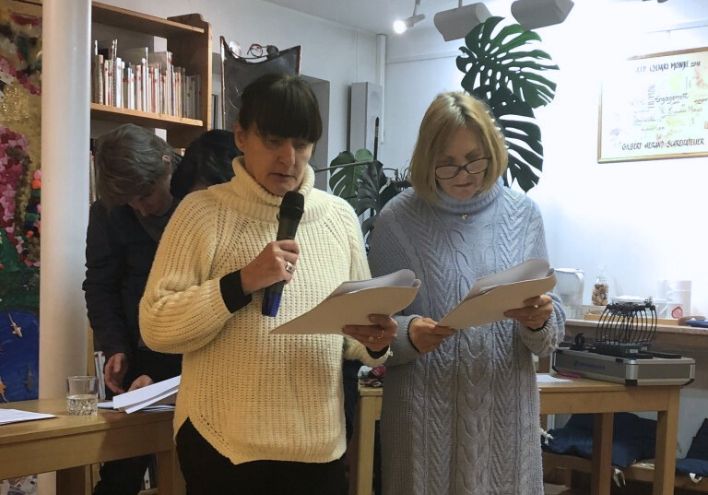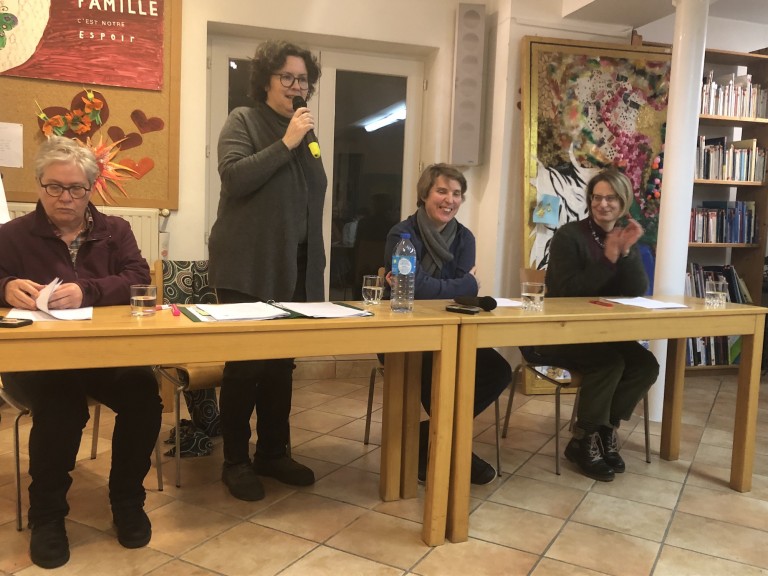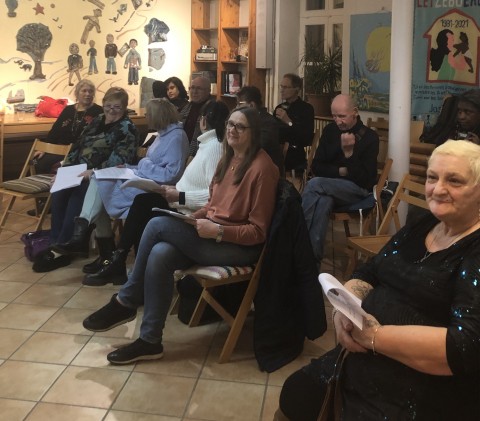Protecting Mental Health in Luxembourg

![]() Reading time 7 minutes
Reading time 7 minutes
In the early 1970s, ATD Fourth World organised several conferences on poverty featuring many renowned speakers. These conferences were open to all— from professionals and academics with a learned understanding of poverty, to people with lived experiences of poverty and first-hand knowledge of social exclusion. However, those from disadvantaged backgrounds often attended without daring to speak, keeping to themselves and avoiding voicing their comments on what had been said until after the conference.
Joseph Wresinski, the founder of ATD Fourth World, was acutely aware of this issue. He understood that in order to build a fairer society, people living in poverty and experiencing social exclusion must be listened to. As a result, he recognised the need to create a new type of gathering: one where people living in poverty could meet people from a variety of walks of life and feel empowered to engage as equals.
This is the principle upon which the Fourth World People’s University was founded in 1972. It is a forum where people from different social backgrounds come together to discuss and share ideas in a space where all feel able to freely express themselves. Today, these meetings are organised across the world and are an important part of ATD Fourth World.
The Fourth World People’s University and Luxembourg
Since 1982, the Fourth World People’s University has organised several meetings each year in Luxembourg. These meetings are opportunities for people living in poverty to gather in the city of Luxembourg and meet with people involved in the Fourth World Cultural Center.
On the 8th of December, 2023 (after three prior preparatory sessions), the Fourth World People’s University in Luxembourg welcomed Christine Lejeune, from the Ligue Luxembourgeoise d’Hygiène Mentale (Luxembourg Mental Hygiene League), and Muriel Nossem, a story-teller who enriched the discussions and testimonies with two fascinating stories.
Participants shared powerful stories and experiences relating to the topic of mental health, and discussed the different factors that might affect it. Grief, loneliness, guilt, harassment, insomnia, the daily struggle of living in poverty and fighting for rights, as well as the role of seasons and climate, were some of the elements brought up during discussions. The words shared were impassioned and moving, and some examples can be found below.

How does poverty affect mental health?
“As a mother, I deal with grief differently — grief will never leave me, anyway. There is someone whom I will always miss, and although this feeling may weaken at times, it will never disappear. Life is good, and life must go on, even though I miss my son.”
“After my husband died, for eight days I lived without really knowing how I managed. I functioned only for the sake of my children and fell apart after one week. I still do not know what happened that week.”
“I have been harassed since kindergarten because I do not match what people expect from me.”
“One becomes more vulnerable when one’s friends are struggling.”
“Nobody speaks to me, and I am constantly alone. I need to take care of myself on my own.”
“In our culture, one has to be beautiful, look perfect, and be in good health. When you are ill, you no longer matter.”
“Selflessness has disappeared, and so have spontaneous, informal discussions. People no longer dare to visit each other—they prefer to call or text each other.”
“Being right and not being able to get others to acknowledge that you are right in your own way is very frustrating. You have to fight all the time.”
“I do not like autumn and winter, because it gets dark earlier. I would rather stay in bed on rainy days.”
“It is as if nature was also depressed because humans are destroying it. Nature also has a life of its own, and nature is calling for help.”
“I haven’t slept in a long time. When I am angry, and when I feel I am being treated unfairly, I no longer sleep. I struggle to get rid of my anger. I have been taking sleeping pills for a few days and I am getting more sleep.”
“I was always blamed when I was younger. It was always my fault and it is still always my fault today. I don’t blame others—I blame myself.”
What are some of the barriers to receiving support?
Seeing a psychologist or a psychiatrist can prove difficult: waiting lists can be long, some professionals can behave inappropriately towards patients living in poverty, and information given to patients can be insufficient.
“Psychologists are always asking me to talk about my past and take notes, but I don’t want to tell them everything. They keep rubbing salt into the wound. I don’t want them to do that anymore. I want to move forward and leave the past behind.”
“Doctors don’t really listen. The faster, the better.”
“I have trouble trusting others nowadays. When it comes to psychologists, I would rather speak to people I have known for a long time and whom I can actually talk to.”
“The medication I take has really got me down on my knees. One becomes vulnerable. It’s hard to picture it. They don’t encourage you—they [just] give you medication.”
“The pills make you feel like nothing matters anymore.”
“People hospitalised in closed wards should only be allowed outside if they consent to follow-up appointments. Follow-up at home is possible, but if patients refuse, everything just starts over again once they leave.”
What can help us feel better?
Having a close family and good friends to count on, as well as good relationships with neighbours, are all valuable forms of support. People need human warmth and safety, and though it can be difficult to build trust in ourselves and others, giving ourselves time can also, slowly, help us feel better.
“Friendships must be nurtured. We spend a lot of time together. When one of us feels unwell, she calls the others and we meet up to do something together, like go for a walk. We spend quality time together. We get on well and we need each other. When I was sick, my friend came over and made me vegetable soup. Friendship means getting each other’s minds off things, being available, baking cakes…”
“When one is unwell, one shouldn’t give up and let go.”
“I have asked for help. I go to a day clinic and the consistency helps. Talking about it also helps.”
“Human beings need time to build ourselves up, brick by brick.”
“You need to let go of things. You need to let go of the past and stop overthinking it.”
“I get up early in the morning, before my son. The lights are on when he gets up. I give him safety and I’m there for him, which I enjoy. I am happy if he is happy. I give him what I didn’t get myself. I provide him and my daughter with a sense of safety. We are strong together — a family.”
Having a hobby, such as some form of art or music, or having a pet, can also improve our mental health.
“I need to keep busy—drawing, for example, or doing something around the house. I like singing. Music matters to me, it’s my therapy. When I am alone, I hide behind my cellphone. It reassures me and takes my mind off things. I like to watch films or series in the evenings.”
“I play the guitar and am always wearing my headphones. I live alone.”
“I thought I was incapable of doing anything. I have a right to education, to art. Thanks to the ATD group project, I feel useful. I have been underestimated and have underestimated myself.”
“My dog gives me strength. I talk to my dog when I am struggling. I go out and meet people a lot, which also gives me strength. If it wasn’t for my dog, I would not have gotten up this morning.”


